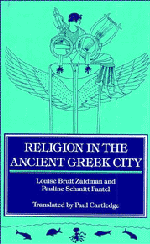Book contents
- Frontmatter
- Contents
- List of illustrations
- Author's preface to the English translation
- Translator's introduction
- List of sources
- PART I Introduction: How should we study Greek civic religion?
- PART II Cult-practices
- 4 Rituals
- 5 Religious personnel
- 6 Places of cult
- 7 Rites of passage
- 8 Settings of religious life
- 9 Religion and political life
- 10 The festival system: the Athenian case
- 11 The Panhellenic cults
- PART III Systems for representing the divine
- PART IV Envoi
- Appendixes
- Bibliography
- Index
4 - Rituals
Published online by Cambridge University Press: 05 June 2012
- Frontmatter
- Contents
- List of illustrations
- Author's preface to the English translation
- Translator's introduction
- List of sources
- PART I Introduction: How should we study Greek civic religion?
- PART II Cult-practices
- 4 Rituals
- 5 Religious personnel
- 6 Places of cult
- 7 Rites of passage
- 8 Settings of religious life
- 9 Religion and political life
- 10 The festival system: the Athenian case
- 11 The Panhellenic cults
- PART III Systems for representing the divine
- PART IV Envoi
- Appendixes
- Bibliography
- Index
Summary
DEFINITION
A ritual is a complex of actions effected by, or in the name of, an individual or a community. These actions serve to organize space and time, to define relations between men and the gods, and to set in their proper place the different categories of mankind and the links which bind them together.
It has often been said that Greek religion was a ‘ritualistic’ religion, that epithet being understood in a restrictive and depreciatory sense in accordance with the hierarchy of values we have already discussed (chapter 1). If, by contrast, one starts from the definition of ‘ritual’ that we have just given, Greek religion may then fairly be said to be ritualistic in the sense that it was the opposite of dogmatic: it was not constructed around a unified corpus of doctrines, and it was above all the observance of rituals rather than fidelity to a dogma or belief that ensured the permanence of tradition and communal cohesiveness. However, this Greek ritualism did not exclude either religious ‘thought’ or religious ‘beliefs’ (see Part III, below); the formalism of ritual observance, moreover, depended on a comprehensive organizing framework that structured both human society internally and its relationships with the surrounding universe.
NATURE AND PERFORMANCE
Everyday private life, no less than public civic life, was rhythmically regulated by all kinds of rituals, so that every moment and every stage of the Greek citizen's existence was intimately imbued with a religious dimension.
- Type
- Chapter
- Information
- Religion in the Ancient Greek City , pp. 27 - 45Publisher: Cambridge University PressPrint publication year: 1992

